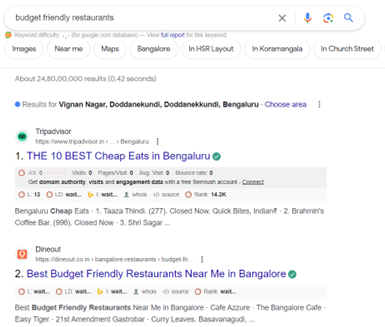SEO, Keywords
Role of Keywords in SEO
Our generation is spearheaded by content, constantly consuming information. Our generation is spearheaded by content, constantly consuming information. Intentionally or unintentionally we are all using keywords to collect, source and gather information. Whether on social media or search engines like Google, understanding the role keywords play in optimisation is paramount.

Keywords Drive Traffic To Your Website
At its most basic element, keywords work as a catalyst that drives traffic to your website. It is through keywords that users find your website on the SERP. When a user triggers the search button using specific keywords, content related to that keyword is tracked by the search engine’s algorithm and displayed on the results page. By strategically knitting content around relevant keywords, websites aim to increase their chances to rank higher on the results page. Higher rankings leads to greater visibility which further leads to greater organic traffic generation. However, the use of keywords in content isn’t just restricted to visibility. Search Engines consider meta tags, headings, URLs to determine the relevance and quality of the content.
Keywords Drive Traffic To Your Website
At its most basic element, keywords work as a catalyst that drives traffic to your website. It is through keywords that users find your website on the SERP. When a user triggers the search button using specific keywords, content related to that keyword is tracked by the search engine’s algorithm and displayed on the results page. By strategically knitting content around relevant keywords, websites aim to increase their chances to rank higher on the results page. Higher rankings leads to greater visibility which further leads to greater organic traffic generation. However, the use of keywords in content isn’t just restricted to visibility. Search Engines consider meta tags, headings, URLs to determine the relevance and quality of the content.

This prompts the businesses involved in rental bikes to optimise their site in such a way that they attract this customer to visit their site. Even though the example above is pretty basic, it covers the general idea that search engines try to grasp the intent behind each search and displays it on the results page and keyword is the root binding it all together. Search Engines analyse the subject matter of your content by the relevance of your keywords and how your content is optimised, which involves placing them across the content.
Well optimised websites conduct keyword research and carefully select the keywords that are popularly searched and use those to rank higher on the SERP and try to stay ahead of the competition
Keywords Take You Ahead
Websites leverage the most searched words to attract more visitors. But can just any word that is mostly searched be used ? not really.
Businesses target specifically those audiences that are more likely to buy their audience. They stick to a specific niche and create a niche audience and then focus on them creating an identity there.
With effective keyword research they identify those that are relevant to them and what they do, pick those with high search volume but at the same time with low competition. This way businesses can be aware of the emerging trends and new opportunities with this focused attention and cater needs accordingly.
When you search for “budget friendly restaurants” the results will not include luxurious hotels as these 5 star and above hotels don’t serve or target the budget friendly customers.

This is a window of opportunity for budget friendly restaurants to capitalise on , market themselves and serve their customers. Keywords help to categorise in between niches which helps to distinguish better.
By knowing why keywords are important you can tailor your content and strategies to enhance visibility, organic traffic, and growth in the digital landscape. If you want to learn more about the types of keywords click here.



